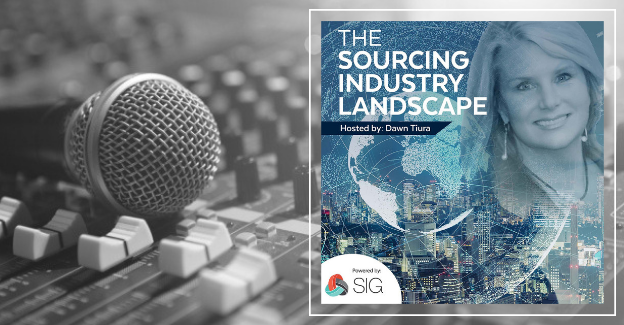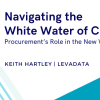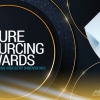In this episode of the Sourcing Industry Landscape, Dawn Tiura interviews Alan Day. Alan Day’s inspiration to found State of Flux was due to a gap in the implementation of sourcing processes post-deal. Having worked in procurement and supply chain for over 20 years, Alan utilized industry best practices to help companies optimize their strategic sourcing goals post-deal through contract management, supplier relationship management and sustainability.
Dawn Tiura: Hi folks, this is Dawn Tiura. I'm President and CEO of Sourcing Industry Group also known as SIG, and with me today is a very interesting gentleman who I have just met by phone, but I've been following his writing and his readings and his musings and just very interesting. Alan Day, he's chairman of State of Flux Limited out of London, UK.
Dawn Tiura: So Alan, welcome to the podcast.
Alan Day: Thanks Dawn and thanks very much for having me. Likewise, I've been following your musings for years and very impressed. So thank you I'm very honored to be part of your webcast series.
Dawn Tiura: Yeah this has all come about because someone you know referred me to one of your articles, I had missed it, and it was called, 'The CPO Needs Selling Skills'. Something like that, to get a seat at the table. But before we go into that, State of Flux is a company that's not as well-known over here in the United States. I'd certainly like to give you a chance to tell us about your company and what it is you're doing.
Alan Day: Thanks, Dawn. We've been working on the well-known side of things, but still got a ways to go. So, been going nearly 15 years. I set the company up after running Accenture’s European Centre of Excellence on Procurement Supply Chain. And prior to that...it's a New Zealand accent, actually. I used to be CPO of New Zealand's largest manufacturer, Fisher & Paykel.
Alan Day: So, if I happen to talk Rugby at any point with any of the listeners at some point, but yeah, so I set State of Flux up 15 years ago, and I've actually written Accenture Strategic Sourcing Process, a number of the European clients is implemented. A lot of notice back then was everyone was very good at implementing at first, so one to five steps and steps six and seven tended to get missed, and almost thrown over the fence to the business.
Alan Day: So when I set up State of Flux I wanted to focus on everything post-deal. So, contract management, performance, risk relationship, innovation management, and lately we've been looking at sustainability as well from a supplier point of view.
Alan Day: So probably five or six things that really we've been focusing on. First 10 years was very much establishing the business and growing it in the UK. About five or six years ago we established Australian and New Zealand, to give me a reason to go home occasionally. And only about two years ago did we...we've been doing work in the U.S., but we've only had a presence on ground for the last two years. We've got a Chicago headquarter and looking to grow there. So, it's kinda the journey of the company. It's been a lot of fun.
Dawn Tiura: No, that does sound like fun. So you say you're from New Zealand then, originally?
Alan Day: Yeah, originally from New Zealand, yeah. I still support any New Zealand team playing, especially when they're playing England. So, yeah, so it's all good fun. And I do try and get back a couple of times. Very excited because recently we've been implementing SRM in my old company at Fisher and Paykel which is, is pretty cool.
Dawn Tiura: Well I'm a big fan of Fisher and Paykel. I actually have your dish drawers.
Alan Day: Ah, very good! Yeah, they were first...I was there when they were first invented.
Dawn Tiura: Yeah, and I think I had your first—the first year it came out, I had it in a home out in California, and then I just recently moved into another house and put them in a new house in Florida. So, I definitely love that company.
Dawn Tiura: So tell me then, you have been in the procurement arena for quite some time. But you also, and believe me, I think you're doing the exact right thing by focusing in the post-contract award, compliance, governance, risk—because that is just hugely missed by so many people. But also you recently wrote about CPO's not having selling skills. And I guess, I sort of debated that when I was reading the article, because I think to be able to get people to change and to buy into these agreements and these massive transformations, you have to have sales skills. But you don't feel that they have enough of it. So, can you sort of share your insights about why a CPO, how a CPO can get a seat at the table, and why more CPO's need to be—or why CPO's have not become CEO's as often as you'd like to see?
Alan Day: Yeah, well, and I was lucky because my old CPO became CEO at Fisher and Paykel, so I had a great role model. And to be fair, in leaving Fisher and Paykel, remained a mentor. So, I had seen it happen, but I think one of the challenges we've got is yes, I completely agree that we need selling skills to sell these big concepts, and especially around supply and management. Actually, we're often the business, doesn't get it. But there's something about owning a sales target, about getting someone to part with cold hard cash that I think a CPO needs to know. And you know, a few of the front end of the business—if you're not getting cash in the door, then you haven't got a business.
Alan Day: So, the more I've seen it, the more I start to realize the CEO role is 80 plus percent sales. And it's all about hitting those sales targets and so on and so on. And I'm a little nervous that a lot of our effort in procurement is being about making us a better admin function, which is a bit scary. But you know, look, some fantastic work being done analytics, on all the work that was done around alternating ERP's etc. All that's great stuff, but really it just makes us a better admin function. And to be strategic, we need to be able to come into the business with the customers, understanding customers, selling to the customers, and providing strategic direction to the business. And we don't do that if we're positioned as a good admin function.
Dawn Tiura: I absolutely, positively agree with that. Because I do think that the CPO, you know I'm a bean counter by trade, so I'm a CPA, and I have great respect for the office of the CFO. But truly they're seeing things when things are budgeted and they're seeing things when the financial statements are complete. And the CPO is actually seeing the stupidity, the redundancy, the waste as it's happening live in the supply chain. And I think they have such an ability to have a strategic impact to the bottom line and top level growth by all of their interactions and innovations coming from the suppliers.
Dawn Tiura: So, what is the message to get to CPO's today? Because I think they have such visibility that they should be selling the fact that they have all this visibility and they can impact play while it's happening, on the ground or on the field, you know, live. So, why are we not getting that message across?
Alan Day: To be completely honest, I just don't think we're hitting the rights. I think we, I come back to we're being a great admin function. We're not earning the right to be strategic. Not standing back and saying how is this, how do I make this business run better? How do I get us more sales, more revenue. More, you know, more profitability that I can focus on. And we've become caught up in the traditional buying stuff and being better at buying stuff. So, I think earning that right is absolutely critical. And I'm not saying that stuff isn't important; it is. But all that is, is it kinda gets the door slightly ajar. We need to open the door and walk through...it in terms of, and I, and maybe I would say this because this is our focus around supply and management. But I think that does give us a far more strategic right, because the business isn't interested in our category plans, that's procurement speak. Businesses is interested in how I am going to achieve my targets for the year.
Alan Day: And actually these, making sure these suppliers don't let you down. So they're interested in what you do with the supplier, they're interested in innovation come from that supplier. They aren't interested in the category plan or your personal savings target. So, I think we just, we need to kinda walk through that door a bit more boldly, and possibly use vehicles like supply and management, which is more of a business change program lead by a procurement rather than a procurement change program. So, to push that door open fully. So that's kinda where I think our focus needs to be. You know, running RFP’s and doing spend analytics are either going to be automated or an admin function. And I think we need to realize that and move quickly away from that.
Dawn Tiura: And yet I still see companies today, Alan, and you probably do, too, that still don't even have their arms around their spend analytics. Let alone, be moving to the strategic. So, when you're engaging with clients, how do you get them started? How do you get a CPO who's not seeing the light really jazzed up and excited about their capabilities and the in-roads that they could have?
Alan Day: Yeah, so one of the things I suppose is two techniques we've been using. One is we've been doing the annual global SRM surveys; this is the tenth year of doing it. So then I've got a million and a half data points, around what is kinda good practice, from over two thousand companies. So, getting some kind of diagnostic of where you are as a business versus where you could be is quite important. So that's one technique that we use, and the other one is what we call a voice of the supplier. Where we're looking at, not individual suppliers views of the relationship, but actually taking a couple hundred suppliers, what's important to them. Where's that business—doing well or not—versus their key competitors so that we can work out whether our customer choice. And those two things to show that, they're not, you know, they're not the infrastructure well to manage the supplier and they're not a customer choice, tend to really resonate. Not just for the CPO, but a number of very large clients that's gone straight to CEO desk actually.
Dawn Tiura: Yeah, and not being a customer of choice means you're not going to get the service levels, and the expectations aren't going to be met by the supply base, because they don't want to have to deal with you if they don't have to.
Alan Day: Completely, we know so the stats are from the research, if you're not a customer, well a customer choice it’s twice as likely to get access to the A-team, twice as likely to get scarce resource, twice as likely to get preferential pricing and four times as likely to get access to new innovation.
Dawn Tiura: Wow!
Alan Day: So, it's really, really worthwhile doing.
Dawn Tiura: So what if you don't have the spend? What if you aren't large enough to make, I mean you can be a good customer, but maybe you don't have to spend to really influence that supplier. Do you still want to be the customer of choice in that case?
Alan Day: Good question. So we've done some research on that and I think the key thing is actually, is three parts to why you would be a customer of choice. One is...money. So, you're either a big spend or a big customer, sorry…profit. So, and lets come back to money in a minute. The other one is around brand alignment. So we want, you know, that supplier wants your brand on their corporate CV. And the last one is behaviors and what you like to work with. And what we've found is, when you look at these three things over time—take the money one—t's a bit like a salary. It's not a motivator, but it's a big de-motivator if someone mucks around with it. So, you know, if you think of the supplier, why are they any different? If we agree a price, they do a good job, they expect to get paid. If we muck around with their payment terms or withhold the cash, then that's a huge de motivator. But actually, money isn't really...you know, once they’ve won your business, it's not really why they get out of bed.
Alan Day: In brand enlightenment, if you look at that one, it's like anything. After a while, you start taking things for granted. So, you know, initially the joy of winning that flash new brand as a customer is very exciting, everyone wants to work on it. If they're not very nice to deal with, or it's a pain, or actually you get to see the inner workings that's not as flash as the branding, and actually the cash value of that brand can sort of decline. So the only one that sustains over time is, what do you like to work with? And that doesn't really matter on size. And then also it's the one that we as procurement put very little effort into. And yet it's the biggest reason why you would be a customer of choice. The people that do it very, very well are often the luxury brands. And they've talked to us about concepts around supplier loyalty—which you never hear the big brands talk about.
Dawn Tiura: No...so you're saying luxury brands. So tell me a little bit more about that.
Alan Day: Yeah so, as part of our annual research, one of the years, our clients would work with McLaren, the car company and Formula One team. And they asked us to do a special report on luxury brands, so we went out and surveyed and interviewed quite a number of brands that you want to spend your money on. And there was a couple common things that came through that, and the most common was the effort they put into driving supplier loyalty. Often because they're production runs were a lot smaller than their competitors, and they were often looking for very cutting edge and very different things for their customers. So they would do, they would just create innovated things to get supplier bought into their brand to make sure they got things first, etc. So, for example, McLaren had one of their luxury road cars that they take around supplier’s factories and they will show the people, not the managers, but the people working on the line, what their product is, or service is, where it fits in the car, how it affects the overall service, and then often they'll take them for a spin to show them as well.
Dawn Tiura: Wow!
Alan Day: So it's pretty cool and clearly as you can imagine, the amount of loyalty that they get from the suppliers is fantastic. But I never hear of a big brand talking about how do we create supplier loyalty or how do we drive the consistent supplier experience. Those sort of things which is...lexicon I think we need to start using...from the procurement point of view.
Dawn Tiura: And I do have to say, I'm so tired of people just saying, you know, that the procurement’s only role is to just lower the cost, constantly lower the cost. And I think that puts them at odds with so many of the suppliers. So the more I find, you know, CPO's talking about value and adding top line revenue and really pushing quality and service levels and not just total cost all the time. Or “price,” even worse than the words total cost. It's refreshing when you find a CPO that speaks a different language than that.
Alan Day: Completely agree and hopefully we're all getting, there is a bit of a sea change of CPO's moving from up the table focus on price through to collaboration and mutual value, really.
Dawn Tiura: Yeah.
Alan Day: Because I actually think that actually, one is more enough for all of us, and two...it's better for the business in the long run versus a short term focus. Suppliers are like
elephants, they don't forget.
Dawn Tiura: You're so right, you're so right! They can tell you about that one episode they had with you nine years ago, yep.
Alan Day: Oh, absolutely! And you can make damn sure that they will recoup that revenue that you've shouted them off with.
Dawn Tiura: Many times over probably too.
Alan Day: I do have a question actually for some of your listeners, Dawn, which is: as procurement, do we drive up cost? Because just the mere fact of running RFP’s means that all the suppliers have put in effort to create these RFPs—which as an industry increases the cost.
Dawn Tiura: It does. You know, you're right. And I'm finding more and more suppliers who are not going to show up for the RFPs. They don't want to be one of many, many, many that are responding because of the wasted time and energy and the expense of answering them, so we definitely are driving up cost. Especially when we are including suppliers we have no intention on ever awarding to.
Alan Day: Yeah. So, here we are supposed to be the champions for running our best businesses more efficiently. Any yet, the mere fact of running RFPs is actually driving up cost and making it more inefficient. So, I do think we need to start challenging our own models and looking at how can we get the best. And I'm not saying there isn't a place for running an RFP. But maybe, it's become our brand rather than just a tool to use at the right time sort of thing.
Dawn Tiura: Yeah.
Alan Day: And I think, if it is our brand, then to our point to CPO selling their way to CEO, no organization is going to ever brand RFP, running it. So, we as an industry need to break out of that and focus more on strategics, but that to—that can't be running more RFP's.
Dawn Tiura: I love that! Alan, I'm gonna have to get you in front of the SIG audience one day because I love the message that you're carrying on. And, folks, this is Alan Day. He's with State of Flux Limited out of the UK. But they do have Chicago offices; New Zealand; Australia, so they are a global business. And I would recommend that you subscribe to his blog. Some fabulous writings if you go to State of Flux and search for Alan Day. Also, through his Linkedin profile, you're going to find some great musings. And Alan, I just want to thank you for your time today. It was great getting to know you!
Alan Day: Likewise, Dawn. Thanks for having me. And as I said, I'm honored to be part of your series.
Dawn Tiura: Well, I'm so honored to have you as part of the podcast. And next time you're over on this side of the lake, give me a call. I'd love to meet up in Chicago and get to know you personally on a more detailed basis. And get you into the SIG community. So Alan, I want to just thank you and hope you have a wonderful afternoon and...great rest of your week.
Alan Day: Thanks, Dawn.
Dawn Tiura: Thank you, folks. So, this is Dawn Tiura, signing out from Art of Procurement Podcast Series podcast series with Alan Day, State of Flux Limited. If you don't know Alan Day, you need to get him in your Linkedin profile and get to know this man. Just fabulous information that he is sharing, and I couldn't be more pleased with spending the time with him today. So, thank you everybody. Happy listening!





